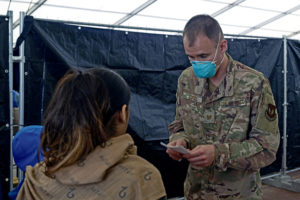
During Afghanistan evacuation operations, the 86th Operational Medical Readiness Squadron’s mental health flight has been targeted to care for the military and evacuees.
Many Airmen have been working longer hours than usual — often outside their career fields — assisting in food distribution, donation deliveries, tent build-ups and trash collection within the transient lodging areas.
In such an uncertain time, it’s important people know there are several resources available for service members who might need help processing experiences from supporting evacuation efforts.
“Anytime there’s a real-world event, team members from Disaster Mental Health are able to offer several counseling sessions for individuals to process the event, in which no notes are entered in their medical record,” said Capt. Anna Davis, 86th OMRS disaster mental health team chief. “This applies to anyone who has participated in (the evacuation), who could benefit from processing experiences and reactions directly related to this mission.”
Service members can go to the mental health front desk and request DMH services to speak to a provider.
“In the military, support is always within reach, sometimes we just have to take that first step outside of our comfort zone and talk to someone we trust,” Davis said. “It’s not always easy, but I’ve rarely heard someone be shunned or denied when they reached out for help whether it was from a chaplain or mental health provider, or a friend or co-worker.”
The mental health team has also been available to help evacuees cope with being in a new environment, far away from home.
“The DMH team has worked with the medical staff to respond to evacuees with depressive and anxious symptoms, grief, trauma, and feelings of hopelessness,” said Maj. Rachel Wiley, 86th OMRS mental health flight commander. “We have had the opportunity to sit with evacuees, hear their stories, help them feel less alone through this process and advocate for individuals who have mental health needs.”
In addition to supporting the mental health of military and evacuees, the mental health flight has also provided volunteers to aid in the physical well-being of the evacuees.
“We have been transporting patients, helping the USO and Red Cross pass out donations and water bottles, finding tents and cots for women and families, creating safe coloring spaces for children while waiting to in-process and helping with food preparation,” Davis said. “In these moments, we are always wearing our mental health hats. We might be setting up a tent with someone while asking questions about their experiences and allowing them space to discuss challenges they have faced while being involved in the mission.”
To continue supporting evacuees while at Ramstein, it’s imperative Airmen remain resilient and mentally tough. In the event they’re not or need a few new coping skills, there are several resources and recommendations provided by the mental health flight for those who might experience adverse thoughts and emotions.
“We talk a lot about self-care in mental health. But self-care is not just taking bubble baths and meditating once a week,” Davis said. “Self-care is connecting with others in a meaningful way and increasing activities that engage your brain, body, mind and spirit. Decompressing can look different for each person. It is important for each person to find what allows them to recharge.”
The second core value of the U.S. Air Force is Service Before Self; in order to serve others, Airmen must take care of themselves, physically, spiritually and mentally.
“The mission never stops and it is extremely important for us to be checking in with each other,” Wiley said. “We all need time to connect and decompress and we can mitigate total exhaustion and burnout if we take care of ourselves and reach out to those who need extra support.”
If an individual would like to engage in general mental health services they can call the front desk at DSN 314-479-2390 and set up an appointment or walk into the medical clinic if they have acute needs during duty hours. Other resources include the Military and Family Life Counseling Program, Military One Source and speaking to a Chaplain.


